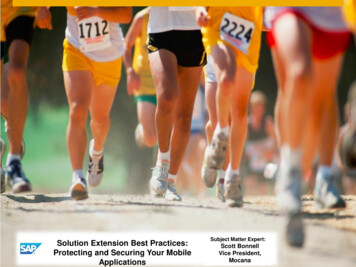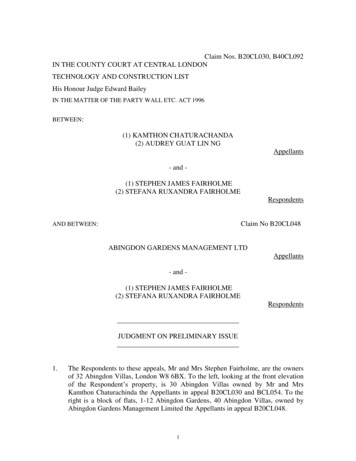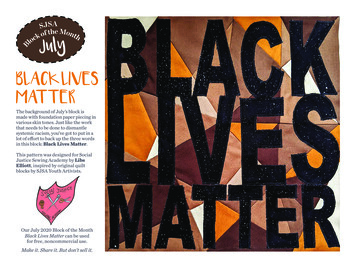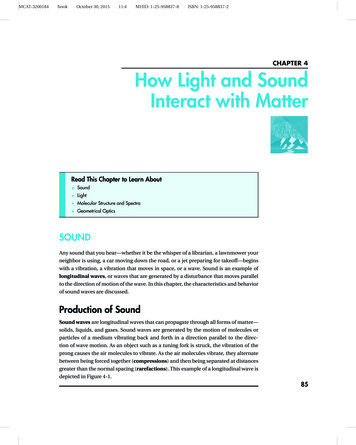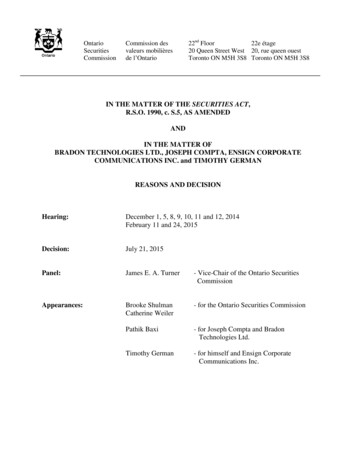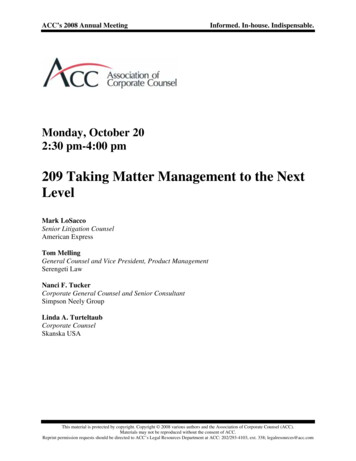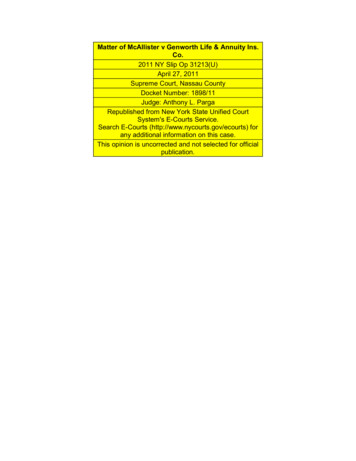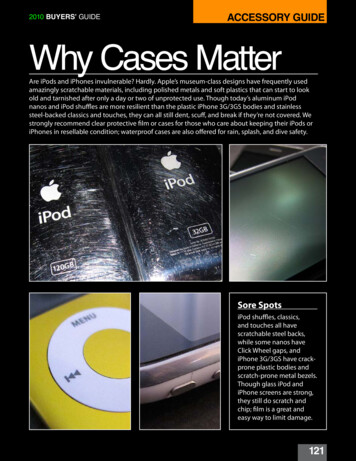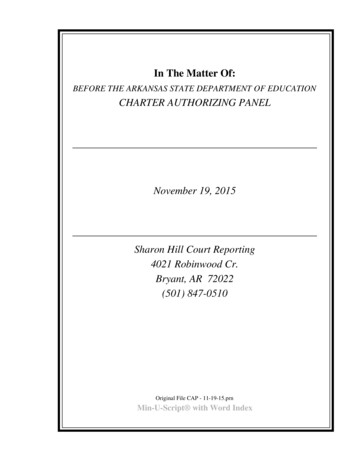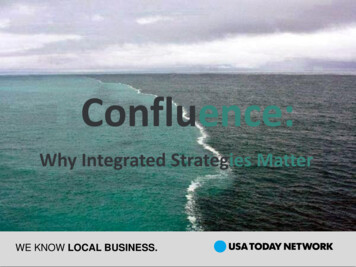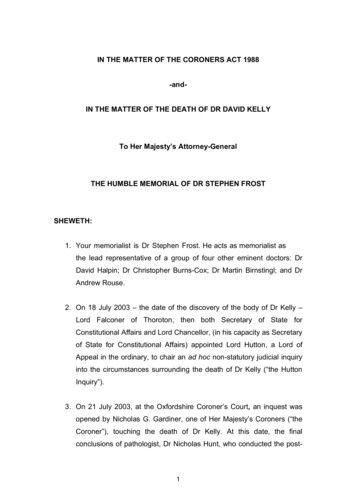
Transcription
IN THE MATTER OF THE CORONERS ACT 1988-andIN THE MATTER OF THE DEATH OF DR DAVID KELLYTo Her Majesty’s Attorney-GeneralTHE HUMBLE MEMORIAL OF DR STEPHEN FROSTSHEWETH:1. Your memorialist is Dr Stephen Frost. He acts as memorialist asthe lead representative of a group of four other eminent doctors: DrDavid Halpin; Dr Christopher Burns-Cox; Dr Martin Birnstingl; and DrAndrew Rouse.2. On 18 July 2003 – the date of the discovery of the body of Dr Kelly –Lord Falconer of Thoroton, then both Secretary of State forConstitutional Affairs and Lord Chancellor, (in his capacity as Secretaryof State for Constitutional Affairs) appointed Lord Hutton, a Lord ofAppeal in the ordinary, to chair an ad hoc non-statutory judicial inquiryinto the circumstances surrounding the death of Dr Kelly (“the HuttonInquiry”).3. On 21 July 2003, at the Oxfordshire Coroner’s Court, an inquest wasopened by Nicholas G. Gardiner, one of Her Majesty’s Coroners (“theCoroner”), touching the death of Dr Kelly. At this date, the finalconclusions of pathologist, Dr Nicholas Hunt, who conducted the post-1
mortem on Dr Kelly’s body, were not available and so the hearing wasadjourned.4. The Hutton Inquiry opened on 1 August 2003 with the terms thecircumstances surrounding the death of Dr Kelly". Full hearings in theHutton Inquiry then began on 11 August 2003.5. On 13 August 2003, Lord Falconer, this time in his capacity as LordChancellor, invoked s17A Coroners Act 1988 and the Coroner, findingno exceptional reason to the contrary as required by that statutoryprovision, adjourned the inquest into Dr Kelly’s death pending theoutcome of the public inquiry.6. On 28 January 2004, Lord Hutton formally delivered his report to theSecretary of State for Constitutional Affairs. From the evidence heardby him, Lord Hutton adopted the conclusions of the Home Officepathologist, Dr Nicholas Hunt, following his examination of the scene ofthe discovery of Dr Kelly’s body and subsequent post-mortem: that thecause of Dr Kelly’s death was as recorded on the death certificate:"1(a) Haemorrhage1(b) Incised wounds to the left wrist.2 Co-proxamol ingestion and coronary artery atherosclerosis"Accordingly, the primary cause of death was said to have been thebleeding caused by cuts to Dr Kelly’s left wrist, not the ingestion ofcoproxamol or coronary artery atherosclerosis. A copy of the deathcertificate can be found at Appendix 1.7. On 16 March 2004, the Coroner held a further hearing to determine thequestion under s17a(4) Coroners Act 1988 as to whether there existedany exceptional reason for resuming the inquest following the2
conclusions reached by Lord Hutton and approved by the LordChancellor. At that hearing, at which only the Ministry of Defence andthe Hutton family were represented, the Coroner concluded – in ahearing lasting no more than 15 minutes – that there were no suchexceptional reasons and did not resume the inquest.Central premise:a. a failure to pursue available lines of inquiry at the inquiry and theexistence now of new evidence means that a full inquest is “necessaryor desirable in the interests of justice”;b. the non-statutory Hutton Inquiry established by the Secretary of Statefor Constitutional Affairs and commended to the Coroner by the LordChancellor (in reality, the same person) as an adequate means tosatisfy the requirements of a Coronial inquest under s17A Coroners Act1988 was not in fact an adequate inquiry;c. the conclusions of the Hutton Inquiry, which were accepted by theCoroner without a substantive hearing, were not the result of a “full,frank and fearless” investigation. Had the inquiry been so, much of theevidence now available could have been put before and taken intoconsideration by Lord Hutton;d. the Coroner refused to resume the inquest and rejected relevantevidence following the findings of the Hutton Inquiry despiterepresentations made and evidence submitted to him as to theexceptional reasons why an inquest should in fact be held; ande. upon a review of the evidence now available, there was insufficientevidence available to the Hutton Inquiry at the time to reach theconclusion that Dr Kelly had deliberately killed himself and that theprimary cause of death was, as recorded on the death certificate:"1(a) Haemorrhage3
1(b) Incised wounds to the left wrist.”Your memorialist and his colleagues therefore humbly pray that you bepleased to use your discretion under s13 Coroners Act 1988 and therebymake an application to the High Court of Justice to require that a full andproper inquest be held. By the discovery of new facts and evidence,insufficiency of the previous inquiry, rejection of evidence and due toprocedural irregularities of a material nature in the inquiry, the Coroner’sproceedings and (potentially) the gathering of the evidence relied upon in theHutton Inquiry, it is in the interests of justice that the High Court directs a fullinquest be held touching the death of Dr David Kelly.The arguments below are set out as follows:PageSection 1Factual backgroundSection 2Legal principlesSection 3Evidence before Lord HuttonParagraphat the time of the inquirySection 4Arguments and evidence as tothe need for a new inquestSection 5ConclusionsSection 1 – Factual background1. Dr Kelly was an eminent government scientist of exceptionalknowledge, skill and experience specialising in biological weapons whowas employed by the Ministry of Defence. He was the government’smost senior scientist and weapons inspector and had the highestpossible security clearance available (for both the United Kingdom andUnited States). A copy of this is to be found at Appendix 2. He had alsoformerly worked as a weapons inspector for the United Nations. In July2003, Dr Kelly’s name was leaked to the press as the source of a storybroadcast by the BBC about the British government’s dossier onweapons of mass destruction in Iraq. On 15 July 2003, Dr Kelly was4
summoned to appear before the Parliamentary Foreign Affairs SelectCommittee which was investigating Britain’s path to war with Iraq.2. On 17 July 2003, Dr Kelly worked at home in Oxfordshire beforeleaving at around 3pm to go for a walk, as he did on a daily basis.When he had not returned by around midnight, his wife, Mrs JaniceKelly, reported him missing.3. On the morning of 18 July 2003, Dr Kelly’s body was discovered in anarea of woodland called Harrowdown Hill around a mile from his homeby two members of a search party set up after he had been reportedmissing.4. The Home Office pathologist, Dr Hunt, was called to the scene by theThames Valley Police on the same day, 18 July 2003. Dr Hunt carriedout investigations of the scene between 12.10-12.35pm and 2.107.19pm. He then conducted a post-mortem examination of Dr Kelly’sbody at the mortuary at the John Radcliffe Hospital, Oxford, between9.15pm that evening and 12.15am on the morning of the 19 July 2003.5. A death certificate in Dr Kelly’s name was registered on 18 August2003 with the primary and secondary causes of death stated asfollows:"1(a) Haemorrhage1(b) Incised wounds to the left wrist.2 Co-proxamol ingestion and coronary artery atherosclerosis"6. Dr Hunt was then called as a witness by Lord Hutton at the HuttonInquiry and gave evidence on 16 September 2003. A transcript of theevidence provided by Dr Hunt can be found at Appendix 3.5
7. As stated above, on 28 January 2004, Lord Hutton then formallydelivered his report to the Lord Chancellor. He concluded that thecause of Dr Kelly’s death was suicide by "haemorrhage due to incisedwounds of the left wrist" in combination with "coproxamol ingestion andcoronary artery atherosclerosis"; that is to say that Dr Kelly bled todeath as a result of the injuries to his left wrist.8. Amid growing suspicions among doctors that the cause of deathevidenced by Dr Hunt and provided in his report by Lord Hutton wasimprobable, we wrote, in December 2009 and on behalf of Dr Frost andhis colleagues, to the Coroner to seek disclosure of the medicalrecords and post-mortem documents and photographs relating DrKelly’s death. In January 2010, the Coroner refused our request fordisclosure. He also revealed that, sometime after the conclusion of hisinquiry, Lord Hutton had taken the highly unusual step, in secret, ofrecommending that the records be protected from disclosure orpublication for 70 years from the date of the inquiry. Copies of thiscorrespondence are provided at Appendix 4.9. There followed some media coverage of this surprising revelation and,on 26 January 2010, Lord Hutton himself made a public statement tovarious news broadcasters that he would advise the Ministry of Justiceto disclose the post-mortem report to the doctors. Thereafter, we wroteto the Secretary of State for Justice seeking disclosure of this andadditional documentation. The text of Lord Hutton’s statement isprovided at Appendix 5 and copies of our correspondence with theMinistry of Justice are provided at Appendix 6.10. Since this time, in The Sunday Times on 22 August 2010 (copyprovided at Appendix 7), Dr Hunt has taken the highly irregular step ofspeaking to the media to provide further, more detailed informationrelating to the post-mortem examination and condition of Dr Kelly’sbody than that provided to the Hutton Inquiry in 2003. It is highlyirregular for a Home Office pathologist such as Dr Hunt to discuss with6
the media his findings after the conclusion of the inquisition into adeath – Rule 10 (2) of the Coroners Rules states that “unlessauthorised by the coroner, the person making a post-mortemexamination shall not supply a copy of his report to any person otherthan the coroner”. Although Dr Hunt has not in fact provided (to yourmemorialist’s knowledge) a copy of the post-mortem report to anyother party, he has ostensibly made these statements on confidentialmatters without the required permission of the Coroner and in breachof the Home Office Code of practice and performance standards forforensic pathologists.11. These matters – together with a range of other serious concerns withthe sufficiency of the Hutton Inquiry, the apparent irregularity of severalelements of the Hutton Inquiry proceedings (including questions overits validity as a form of post-mortem inquisition), the myriad ofunanswered and unsatisfactorily answered questions, rejection ofevidence by the Coroner and new expert evidence (all of which aretreated in detail in Section 4 below) – create serious doubt as towhether sufficient evidence existed at the time of the Hutton Inquiry toenable Lord Hutton legitimately to arrive at the conclusion that Dr Kellycommitted suicide or died as a result of the primary cause of deathrecorded on his death certificate. There is therefore an urgent need forthe inquest which the refused – without examining the evidence –refused to resume in March 2004 to be quashed and a new inquestordered under a new Coroner in order to assess the evidence in full.Section 2 – Legal principles12. This memorial requesting that you make an application to the HighCourt to quash the inquest which should have been resumed despitethe invocation of alternative proceedings under s17A Coroners Act1988 is brought under Section 13 of that Act. We set this out here:-13. — (1) This section applies where, on an applicationby or under the authority of the Attorney-General, the7
High Court is satisfied as respects a coroner ("thecoroner concerned") either—(a) that he refuses or neglects to hold an inquest whichought to be held; or(b) where an inquest has been held by him, that (whetherby reason of fraud, rejection of evidence, irregularity ofproceedings, insufficiency of inquiry, the discovery of newfacts or evidence or otherwise) it is necessary ordesirable in the interests of justice that another inquestshould be held.(2) The High Court may—(a) order an inquest or, as the case may be, anotherinquest to be held into the death either—(i) by the coroner concerned; or(ii) by the coroner for another district in the sameadministrative area;(b) order the coroner concerned to pay such costs of andincidental to the application as to the court may appearjust; and(c) where an inquest has been held, quash the inquisitionon that inquest.13. Reference is also made to the recent case of R (on the application ofSutovic) v HM Coroner for Northern District of Greater London: Sutovicv HM Coroner for North London (2006) EWHC 1095 [Admin]. It issubmitted that Sutovic is a case within which the principles of s.13applications are correctly restated by Moses LJ in his judgment.8
14. In Sutovic, the Claimant was the mother of a young man who had diedin Serbia. The mother of the Claimant was unhappy with theinvestigations that had occurred in Serbia and with the inquest that hadhappened in this country. In Sutovic the Claimant successfullypetitioned for the inquest to be re-opened. The claim was brought byway of Judicial Review as well as application under s.13.15. In considering the s.13 claim in Sutovic, Moses LJ made the followingobservations: “The factors of central importance are an assessment ofthe possibility (as opposed to the probability) of a different outcome,the number of shortcomings in the original inquest, and the need toinvestigate matters raised by new evidence which had not beeninvestigated at the original inquest” (para 54). Moses LJ also restatesthe conclusion found in R v West Sussex Coroner, ex parte Edwards[1991] 156 JP 186, that “ a new inquest may be ordered even if there isa high probability that the outcome will be the same.” (para 54).16. This statement echoes the findings of Woolf LJ (as he then was) in ReRapier [1998] 1 QB 26. Woolf LJ found that, “in many cases . it willbe quite impossible to say what will be the effect of the new evidence . However, whatever the outcome, it still may be in the interests ofjustice that their evidence should be explored in public before a jury.”20.A review of the authorities also dem
IN THE MATTER OF THE DEATH OF DR DAVID KELLY To Her Majesty’s Attorney-General THE HUMBLE MEMORIAL OF DR STEPHEN FROST SHEWETH: 1. Your memorialist is Dr Stephen Frost. He acts as memorialist as the lead representative of a group of four other eminent doctors: Dr David Halpin; Dr Christopher Burns-Cox; Dr Martin Birnstingl; and Dr Andrew Rouse. 2. On 18 July 2003 –
